翻译方法和技巧:正反表达法
英汉互译中的正反反正表达法

英汉互译中的正反反正表达法在英汉互译过程中,由于两种语言表达习惯不同,往往需要把英语中的正说译成汉语中的反说,把英语中的反说译成汉语中的正说,或反之,这样才能确切表达原意并符合语言的规范。
这种把正说处理为反说,把反说处理为正说的译法,叫正反、反正表达法。
这种正说和反说的相互转换是翻译技巧中的一个重要方法。
它属于引申和修辞范围。
那么,什么是正说和反说呢?英语词句中含有“never”,“no”,“not”,“non-”,“un-”,“im-”,“in-”,“ir-”,“-less”等成分以及汉语词句中含有“不”、“没”、“无”、“未”、“甭”、“别”、“休”、“莫”、“非”、“毋”、“勿”等成分的为反说,不含有这些成分的为正说。
正说和反说包括的词类范围很广,不仅包括动词、形容词、副词、名词、介词和连词,而且包括各种词组,短语和从句。
现以实例对正反、反正表达法加以说明。
一、英译汉正说反译法在不少情况下,由于有的词语含有特殊意义,如不从反面着笔,译文就不通,这时必须反说。
例如:1)“I have read your articles.I expect to meet an old man.”“我读过你的文章,没想到你这样年轻。
”(动词)2)He was absent from his own country last year.他去年不在自己的国家。
(形容词短语)3)He dived into the water fully clothed and rescued the children.他衣服没脱就跳入水中,把孩子救了上来。
(副词)4)He was extremely sorry for the shortness of time.他对时间不足感到十分抱歉。
(名词)5)I do think that it is beyond his power to fulfill the task.我的确认为要完成这项任务是他力所不及的。
实用翻译技巧:正译法和反译法
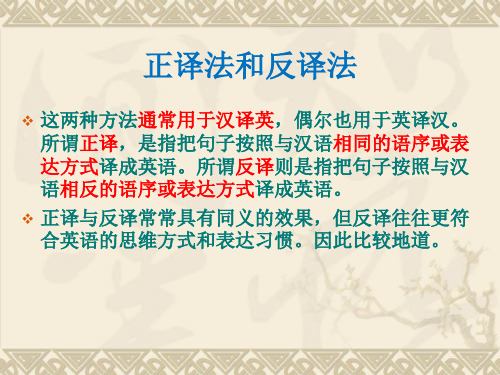
❖ (1)I believe strongly that it is in the interest of my countrymen that Britain should remain an active and energetic member of the European Community.
❖ 我坚信,英国依然应该是欧共体中的一个积极的和 充满活力的成员,这是符合我国人民利益的。(部 分倒置)
❖ (2)Stormy applause broke forth the moment she appeared on the stage.
❖ 她一出现在台上,就爆发出雷鸣般的掌声。
❖ (3)改革开放以来,中国发生了巨大的变化。 ❖ Great changes have taken place in China
❖ (6) Please withhold the document for the time being. ❖ 请暂时扣下这份文件。(正译) ❖ 请暂时不要发这份文件。(反译)
六、倒置法
❖ 英汉双语经常出现语言表达顺序不对等的情况。比 如:在汉语中,定语修饰语和状语修饰语往往位于 被修饰语之前;在英语中,许多修饰语常常位于被 修饰语之后,因此翻译时往往要把原文的语序颠倒 过来。
(反译)
❖ (2) 你可以从因特网上获得这一信息。 ❖ You can obtain this information on the Internet. (正译) ❖ This information is accessible/available on the Internet.
英语语句翻译方法

英语语句翻译方法英语语句翻译方法有哪些?翻译其实只要掌握了方法并不难,看看下面吧!一、正反、反正表达法i.汉语从反面表达,译文从正面表达例1:他提出的论据相当不充实。
译文:The argument he put forward is pretty thin. (词) 例2:我们确信,年轻一代将不会辜负我们的信任。
译文:We are confident that the younger generation will prove worthy ofour trust. (短语)例3:他七十岁了,可是并不显老。
译文:He was 70, but he carried his years lightly. (句子)II.汉语从正面表达,译文从反面表达例1:他这个人优柔寡断,而且总是反复无常。
译文:He was an indecisive sort of person and always capricious. (词)例2:调查结果清清楚楚地显示病人死于心脏病。
译文:The investigation left no doubt that the patient had died of heartdisease.(短语)例3:这类举动迟早会被人觉察的。
译文:Such actions couldn’t long escape notice. (句子) III.特殊的否认句式例1:有利必有弊。
译文:There is not any advantage without disadvantage. (双重否认)例2:我们在那个城市从未因为是犹太人而遭受歧视。
译文:In that city, we had never suffereddiscrimination because we wereJews. (否认转移)二、分句、合句法I.分句法汉译英时,需要分译的句子多数是长句,或者是构造复杂的复句。
这种句子如果译成一个长句,就会使译文冗长、累赘、意思表达不清楚,也不符合英文习惯。
(完整版)翻译技巧翻译方法_文档视界
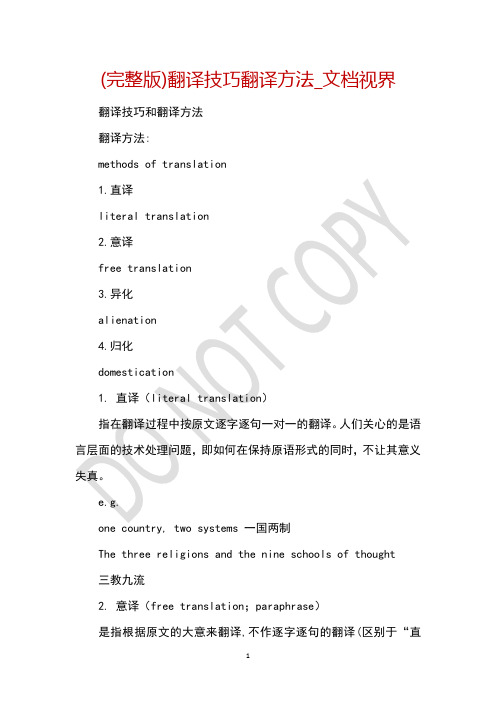
(完整版)翻译技巧翻译方法_文档视界翻译技巧和翻译方法翻译方法:methods of translation1.直译literal translation2.意译free translation3.异化alienation4.归化domestication1. 直译(literal translation)指在翻译过程中按原文逐字逐句一对一的翻译。
人们关心的是语言层面的技术处理问题,即如何在保持原语形式的同时,不让其意义失真。
e.g.one country, two systems 一国两制The three religions and the nine schools of thought 三教九流2. 意译(free translation;paraphrase)是指根据原文的大意来翻译,不作逐字逐句的翻译(区别于“直译”)。
通常在翻译句子或词组(或更大的意群)时使用较多,意译主要在原语与译语体现巨大文化差异的情况下得以应用.从跨文化语言交际和文化交流的角度来看,意译强调的是译语文化体系和原语文化体系的相对独立性。
e.g.Don’t cross the bridge till you get to it.不必过早地担心。
(不必自寻烦恼)Do you see any green in my eye?你以为我是好欺骗的吗?Don’t lock the stable door after the horse has been stolen.直译:不要等马被盗后,才去锁马厩门。
意译:亡羊补牢。
直译和意译的区别1. It’ s a Smoke Free Area.直译:它是个自由吸烟区。
意译:它是个无烟区。
2. Shakespeare put his hometown on the map.直译:莎士比亚把他的家乡放在了地图上。
意译:莎土比亚使他的家乡声名远扬。
3. John would not come out of his shell and talk to others at theparty.直译:晚会上,约翰不愿从壳里钻出来与其他人说话。
正说反译、反说正译法

• 老师发现有些学生不在。
精品..
正说反译法(形容词)
• She said angrily,the men are all bad! • 她愤愤地说,男人都不是好东西! • You are a bad boy! • 你是个不听话的孩子! • The company’s failure was due to bad
• He is above meanness and deceit. • 他不至于做卑鄙和欺骗人的事情。
• Her behaviour was above suspicion. • 她的品行不容怀疑、
精品..
正说反译法(虚词)
• Few of my friends speak French. • 我的朋友中几乎没有人说法语。 • This was the last place the colonialists
• The revolutionaries were beaten,refused anything to read,kept for a time in semidarkness as well as in chains.
• 那些革命者当时受到拷打,不准阅读任何书刊..
• The window refuses to open. • 窗户打不开。
trying to avoid you ? • 你知道她为什么总是不想见到你吗? • He tried to avoid answering my
questions. • 他试图避而不答我的问题。
精品..
正说反译法(形容词)
• There are two aspects to everything,to say there is only one is to be aware of one aspect and to be ignorant of the other.
翻译的八大常用技巧

作用与意义1. 重译法:为了明确、为了强调、为了生动2. 增译法:为了更忠实于原文的意思,而又更合乎译文的表达习惯3. 减译法:源语言与目标语言互换的时候增译法就成了减译法4. 词类转移法:语言之间表达习惯的差异迫使译文中词类发生改变,词序有时也随之变化5. 词序调整法:语言之间构成形式并非完全相同,做必不可少的词序改变6. 分译法:主要用于长句的翻译,有时存在于词语语义的分译7. 正反翻译法:由于语言的习惯差异---正话反说,反话正说8. 语态变换法:主要指英汉两种语言间的主动与被动语态的转换In the event of one of the contracting parties being attacked by Japan or any other state allied with it and thus being involved in a state of war, the other contracting party will immediate render military and other assistance with all means at its disposal.一旦缔约国的一方受到日本或者与日本同盟的任何国家之侵袭,因而处于战争状态时,缔约国的另一方即尽全力给与军事及其他援助。
We have to analyze and solve problems.我们要分析问题,解决问题。
A large family has its difficulties.大(家庭)有大(家庭)的难处。
Our old clothes and few sticks of furniture have been pawned or sold.这几件旧衣服和这些旧家具,当的当了,卖的卖了。
Lightly floats and drifts the boat, and gently flows and flaps my gown.舟遥遥以轻扬,风飘飘而吹衣。
句子的翻译-正反法

c. 形容词和形容词短语:few, little, free from, far from, safe from, short of等等
这次演出根本没有失败,而是十分成功。
The show was far from being a failure; it was a great success.
13
把马克思主义的普遍真理同我国的具体实 际结合起来,走自己的道路,建设有中国 特色的社会主义,这就是我们总结长期历
史经验得出的基本结论。
To integrate the universal truth of Marxism with the concrete realities of China, blaze a path of our own and build socialism with Chinese characteristics — —this is the basic conclusion we have reached in summing up the long historical experience.
句子的翻译-正反法
1
正反——反正翻译法
英语和汉语均有从正面或反面来表达一种 概念的现象。如果原文从反面表达直译出 来不合乎译语习惯,就可考虑从正面表达, 反之亦然。使用哪种方法,主要看译语表 达习惯及修辞效果而定。
2
正——反翻译法例句: Herb may be dying somewhere, calling out for his mum and
他显然有不同的想法。 He evidently thinks otherwise. 我根本不知道他会遇到什么麻烦。 I little knew what trouble he was going to
第九章正反反正翻译法解析

English-Chinese Written Translation. Copyright (C) 2006 by Wei Jianhua All Rights Reserved
(1)动词:
excuse 对不起 lack 不足/没有 overlook 没有注意 refuse 不答应 hate 不喜欢
English-Chinese Written Translation. Copyright (C) 2006 by Wei Jianhua All Rights Reserved
(5)名词
little没有多少 ignorance 无知 in doubt 拿不准 refusal 不答应 out of place 不恰当/不在适当位置 absence 不在 anything but 概不/决不
●通常正面反译的单词:
miss 未赶上/未击中 fail 不及格/没有成功 ignore 不顾/不理 neglect 不注意 exclude 不包括 refrain from 忍不住… wonder 不知道 fancy 想不到 lose 抓不住 / 听不见/ 看不见
例: 1、The first bombs missed the target. 第一批炸弹没有击中目标。
1.The failure was the making of him. 这次不成功是他成功的基础。 2. The operation only just succeeded and it was fortunate that we had provided additional forces.
这次战役好不容易才取得胜利,也多亏我们增加了兵力。
English-Chinese Written Translation. Copyright (C) 2006 by Wei Jianhua All Rights Reserved
英语翻译正说反译反说正译

英语翻译正说反译反说正译第八章英翻译技巧(五)正说反译反说正译正说反译、反说正译的应用不论是正说反译还是反说正译,究其原因归纳起来主要是:保证语义明确、加强修饰效果、尊重汉语习惯,保证译文通畅易懂。
所谓反面表达,是指英语词句中含有“not”,“never”,“no”,“un-”,“im-”,“ir-”,“in-”,“less-”等否定成分,汉语词句中含有“不”、“没”、“无”、“未”、“甭”、“别”、“休”、“莫”、“毋”、“勿”、“非”等否定成份,不含这些成份的为正面表达。
(一)正说反译的应用1.谓语动词或动词词组本身表示否定意义,常见的有:Fail, fizzle out, fall short, be frustrated, escape, elude, slip away, stop, cease, overlook, ignore, neglect, refuse, grudge(怨恨,不情愿做), disdain, reject, turn down, forbid, prohibit, exclude from, bar, ban, expire, be blind to, deny, avoid, omit, forget, prevent from, live up to, resist, miss, lack.I missed what you have said because of the noise outside.由于外面的噪音,我没听清楚你说的话。
To our disappointment, he failed to take the overall situation into account. 使我们失望的是他不顾大局。
Such a chance was denied to me.我没有得到这样一个机会。
2.介词或介词短语含否定之意,常见的词有:Above, against, below, beneath, beyond, instead of, out of, without, but for。
正反、反正翻译法 ppt课件

The thought of returning to his native land never
deserted him.
归国的念头始终萦绕在他ppt课的件 心中。
16
(3)形容词
英文反面,译文正面
He was an indecisive sort of person and always
would probably have been a success. • 如果他不发脾气,谈判很可能已经成功了。 • The mistake escaped me. • 我没注意到这个错误。
ppt课件
6
正反、反正表示法
• (二)副词
• We may safely say so. • 我们这样说错不了。
• 在中文中,正面和反面表达主要是指是否
用“非”,“无”,“没(有)”,
“未”,“否”等字。
ppt课件
5
正反、反正表示法
• 一、英语从正面表达,译文从反面表达 • (一)动词 • Such a chance was denied me. • 我没有得到这样一个机会。 • If he had kept his temper, the negotiation
carefully and cautiously as he does the unfamiliar.
科学家们在处理熟知的事物时,必须像处理陌生
的事物一样小心谨慎。ppt课件
17
(四)名词
1.It was said that someone had sown discord among them. 据说有人在他们中间挑拨离间。
样的话。
Good winner, good loser. 胜不骄,败不馁。
英汉翻译中的正反表达法

习惯用法
28) He is anything but a writer. 译文:他决不是一个作家。 29)The islanders found themselves far from ready to fight the war. 译文:岛民发现自己远远没有做好作战准备。 30)The decision has to come. 译文:决定尚未作出。 31)It is a wise father that knows his own child. 译文:无论怎样聪明的父亲也不见得了解自己的孩 子。
形容词
12)The light in the classroom is poor. 译文:教室里的光线不足。 13)The explanation is pretty thin. 译文:这个解释站不住脚。 14)He was absent from his own country last year. 译文:他去年不在自己的国家。 15)At present it is generally accepted, although more as a self-evident statement than on the base of a closelyreasoned scientific proof. 译文:目前,这个观点已被普遍接受,虽然它是不言而喻的, 并不是根据科学严密推理而证明的。
英语翻译正反反正表达

2.副词 He carelessly glanced through the note and got away. 他马马虎虎地看了看那张边条就走了。 3.形容词 All the articles are untouchable in the museum. 博物馆内一切展品禁止触摸。
4.名词 He manifested a strong dislike for his father’s business. 他对他父亲的行业表示出强烈的厌恶情 绪。 5.短语 The examination left no doubt that the patient had died of cancer. 调查结果清清楚楚说明病人死于癌症。
6.句子 The significance of these incidents wasn’t lost on us. 这件事引起了我们的重视。
1.An uncomplicated hero who stand up for the little man against forces of corruption and tyranny in a country emerging from the depression. 一个简单而纯粹的英雄——在大萧条肆虐后 的美国为小人物挺身而出,反对腐朽和丏制。 2.He hasn't been constant in terms of characterization. 就人物性格的塑造而言,他并非是一成不变 的。
7.短语 We believe that the younger generation will prove worthy of our trust. 我们相信,年轻的一代将不会辜负我们的信 任。 8.句子 He was 75, but he carried his years lightly. 他七十五岁了,可是并不显老。
翻译的基本技巧--正译与反译

翻译的基本技巧——正译与反译正说与反说的相互转换是翻译实践中极为实用的方法。
在英语中从正面来说的,可能在汉语中要从反面来叙述更加恰当,有些时候英语的反说可能要处理为汉语的正说才符合习惯。
A. “正说反译”请看下面的译例:1) I have read your articles, but I expect to meet an older man.[原译] 我读过你的文章,我料想会见到一个年纪更大的人。
[改译] 我读过你的文章,但没料想你会这样年轻。
[分析] 比较两种译文不难看到,如果机械地套用“正译”,译文后半部分语义不清,“改译”采用反面着笔并加以相应的转换,得到的译文更加通顺达意。
这就是“正说反译”的一个很好的例证。
2) A seaman knows that the sea is all-powerful and can, under certain circumstances, destroy man and the product of his brain and hand, the ship.[译文1] 水手们都知道,大海的威力是最强大的;在某些情况下,它能把人及人所制造的船只统统摧毁掉。
[译文2] 水手们都知道,大海的威力是势不可挡的;在某些情况下,它能把人及人所制造的船只统统摧毁掉。
(正说反译)[分析] 句中the sea is all-powerful 如果用肯定说法直译“大海是最强大的”,便显得很肤浅,没有从深层理解原文,远不如上面的否定说法那样生动而能感染读者。
B. 反说正译3) “Mine! Mine!”They would shout at the pretty rainbows that are down to the earth, seeming never very far away.[译文] 他们会冲着那从天际弯弯地挂向地面的,看来好像伸手可及的美丽彩虹大声呼喊:“哎呀!哎呀!”[分析] 句中never very far away若直译为“离得不太远”就很不深刻,大欠文采,远不如“伸手可及”形象鲜明。
大学英语四级翻译七大技巧
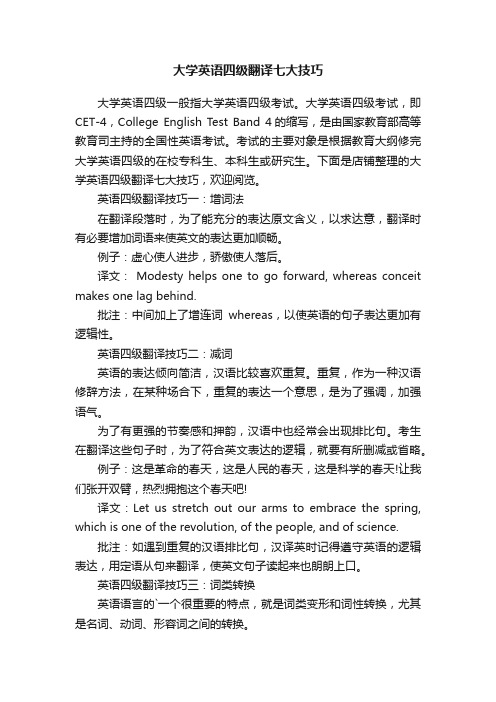
大学英语四级翻译七大技巧大学英语四级一般指大学英语四级考试。
大学英语四级考试,即CET-4,College English Test Band 4的缩写,是由国家教育部高等教育司主持的全国性英语考试。
考试的主要对象是根据教育大纲修完大学英语四级的在校专科生、本科生或研究生。
下面是店铺整理的大学英语四级翻译七大技巧,欢迎阅览。
英语四级翻译技巧一:增词法在翻译段落时,为了能充分的表达原文含义,以求达意,翻译时有必要增加词语来使英文的表达更加顺畅。
例子:虚心使人进步,骄傲使人落后。
译文:Modesty helps one to go forward, whereas conceit makes one lag behind.批注:中间加上了增连词whereas,以使英语的句子表达更加有逻辑性。
英语四级翻译技巧二:减词英语的表达倾向简洁,汉语比较喜欢重复。
重复,作为一种汉语修辞方法,在某种场合下,重复的表达一个意思,是为了强调,加强语气。
为了有更强的节奏感和押韵,汉语中也经常会出现排比句。
考生在翻译这些句子时,为了符合英文表达的逻辑,就要有所删减或省略。
例子:这是革命的春天,这是人民的春天,这是科学的春天!让我们张开双臂,热烈拥抱这个春天吧!译文:Let us stretch out our arms to embrace the spring, which is one of the revolution, of the people, and of science.批注:如遇到重复的汉语排比句,汉译英时记得遵守英语的逻辑表达,用定语从句来翻译,使英文句子读起来也朗朗上口。
英语四级翻译技巧三:词类转换英语语言的`一个很重要的特点,就是词类变形和词性转换,尤其是名词、动词、形容词之间的转换。
例子:她的书给我们的印象很深。
译文:Her book impressed us deeply.批注:在这里汉语中的名词需转化成英语中的动词"impress"。
汉互译中的动词正、反表达方法举偶 绝对有用

litter.如果你不去注意那些垃圾,
one’s to
teacher.他完全没有留意老师所讲的那一番话。
She saw
你就会发现这个公园很美。
close/shut “allow
to
him
coming
but
she
i璺nored
eyes
something意为
him.她看见他走过来,但装作没看见。 上述两句中的ignore只能采用“没有留意 ……”、“假装没有……”等汉语反说的表达形
等最常用的动词均具有“一反常态”的妙用。我 们在进行英汉动词互译时,切不可信手直译。
from going.由于下
雨,我们无法前往。
Peace
there]不要闹!
万方数据
letter,telling
him of my
marriage,
to
exist.这个国家已
must just have
missed him.他偏偏没有收到我
不再存在了。
We唑concerning
矗te of people within
告诉他我结婚的那封信。
ourselves“、7l,idl the the frontiers of che
This country
ceases
式才能确切地表达英语原句中动词所内含的强 烈语气。 “My mother
out,but
I
will—kill
care,”
me when she finds
said
don’t
Betty.贝蒂说:
“我母亲要是知道了,准饶不了我,不过我不在
乎。”
将上句中的kill译为“饶不了”,措辞是十 分和谐的。如果将该词直译为“杀了”或“宰 了”等,语气则显得十分过火且容易引起误解。 My
正反翻译法
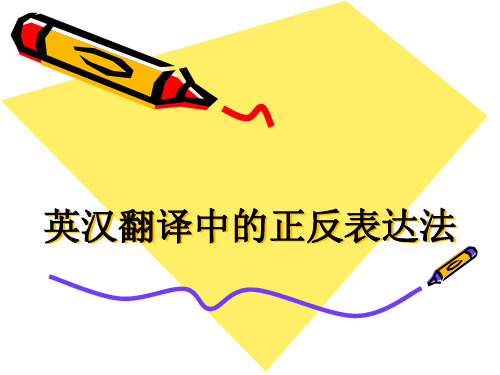
双否定译肯定
• 1)There can be no sunshine without shadow 译文:有阳光就有阴影。 • 2)When we read, we may visit the most beautiful parts of the earth, without fatigue, inconvenience, expense. 译文:我们阅读时可遍访地球上最美丽的地方,轻松, 便捷,便宜。 • 3)It’s not seldom that he plays Majiang. (= He often plays Majiang. ) 译文:他常常打麻将。
Hale Waihona Puke 形容词• 1)The scientist must approach the familiar just as carefully and cautiously as he does the unfamiliar. 译文:科学家在处理熟知的事物时,必 须像处理陌生的事物一样小心谨慎。 • 2)He was an indecisive sort of person and always capricious. 译文:他这个人优柔寡断,而且总是反 复无常。
• 4)It will not be long before they understand the truth that study hard before it is too late. 译文:他们大概不久就会理解要趁早努力学 习的道理。 • 5)She won’t go away until you promise to help her . 译文:她要等你答应帮助以后才肯走。
名词
1)He was extremely sorry for the shortness of time. 译文:他对时间不足感到十分抱歉。 2)Behave yourself during my absence. 译文:我不在时要规矩点。
正反、反正表达法(翻译技巧)
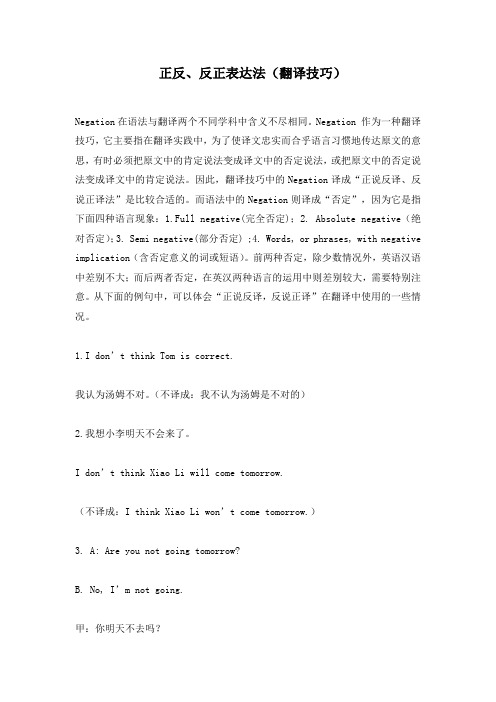
正反、反正表达法(翻译技巧)Negation在语法与翻译两个不同学科中含义不尽相同。
Negation 作为一种翻译技巧,它主要指在翻译实践中,为了使译文忠实而合乎语言习惯地传达原文的意思,有时必须把原文中的肯定说法变成译文中的否定说法,或把原文中的否定说法变成译文中的肯定说法。
因此,翻译技巧中的Negation译成“正说反译、反说正译法”是比较合适的。
而语法中的Negation则译成“否定”,因为它是指下面四种语言现象:1.Full negative(完全否定);2. Absolute negative(绝对否定);3. Semi negative(部分否定) ;4. Words, or phrases, with negative implication(含否定意义的词或短语)。
前两种否定,除少数情况外,英语汉语中差别不大;而后两者否定,在英汉两种语言的运用中则差别较大,需要特别注意。
从下面的例句中,可以体会“正说反译,反说正译”在翻译中使用的一些情况。
1.I don’t think Tom is correct.我认为汤姆不对。
(不译成:我不认为汤姆是不对的)2.我想小李明天不会来了。
I don’t think Xiao Li will come tomorrow.(不译成:I think Xiao Li won’t come tomorrow.)3. A: Are you not going tomorrow?B. No, I’m not going.甲:你明天不去吗?乙:是的,我不去。
4. ①Africa is not kicking out Western Imperialism ②in order to invite other new masters.①非洲踢出西方帝国主义②并不是为了请进其他新的主子。
(假如不运用“正说反译,反说正译”这一技巧,译文就会成为:“非洲不踢出西方帝国主义为了请进其它新的主子。
英汉互译八种技巧
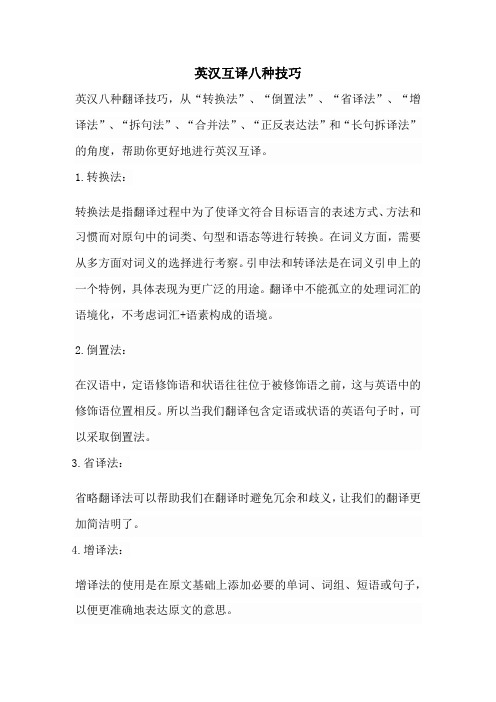
英汉互译八种技巧英汉八种翻译技巧,从“转换法”、“倒置法”、“省译法”、“增译法”、“拆句法”、“合并法”、“正反表达法”和“长句拆译法”的角度,帮助你更好地进行英汉互译。
1.转换法:转换法是指翻译过程中为了使译文符合目标语言的表述方式、方法和习惯而对原句中的词类、句型和语态等进行转换。
在词义方面,需要从多方面对词义的选择进行考察。
引申法和转译法是在词义引申上的一个特例,具体表现为更广泛的用途。
翻译中不能孤立的处理词汇的语境化,不考虑词汇+语素构成的语境。
2.倒置法:在汉语中,定语修饰语和状语往往位于被修饰语之前,这与英语中的修饰语位置相反。
所以当我们翻译包含定语或状语的英语句子时,可以采取倒置法。
3.省译法:省略翻译法可以帮助我们在翻译时避免冗余和歧义,让我们的翻译更加简洁明了。
4.增译法:增译法的使用是在原文基础上添加必要的单词、词组、短语或句子,以便更准确地表达原文的意思。
5.拆句法:当我们面对长而复杂的英语句子时,可以尝试使用拆句法。
这种方法可以帮助我们更好地理解和翻译每一个小句子,从而使整体翻译更加流畅。
6.合并法:与拆句法相反,合并法是将几个短句子合并成一个长句子。
这种翻译技巧通常用于处理英语中的复合句。
通过合并法,我们可以使译文更加紧凑、连贯。
7.正反表达法:有时,英语中的正说可以采用反译的方法,反之亦然。
这种方法可以帮助我们更好地适应不同语言的表达方式和习惯。
8.长句拆译法:对于长而复杂的英语句子,我们可以尝试将其拆分成几个小句子,以便更好地理解和翻译。
这种方法可以帮助我们理清句子的结构和层次,使整体翻译更加清晰明了。
第六章英汉转换译法第一节正面表达和反面表达的转换
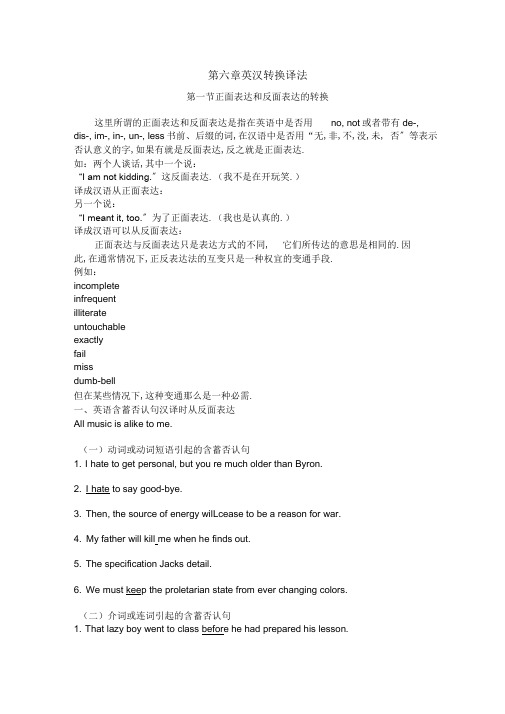
第六章英汉转换译法第一节正面表达和反面表达的转换这里所谓的正面表达和反面表达是指在英语中是否用no, not或者带有de-,dis-, im-, in-, un-, less书前、后缀的词,在汉语中是否用“无,非,不,没,未, 否〞等表示否认意义的字,如果有就是反面表达,反之就是正面表达.如:两个人谈话,其中一个说:“I am not kidding.〞这反面表达.(我不是在开玩笑.)译成汉语从正面表达:另一个说:“I meant it, too.〞为了正面表达.(我也是认真的.)译成汉语可以从反面表达:正面表达与反面表达只是表达方式的不同, 它们所传达的意思是相同的.因此,在通常情况下,正反表达法的互变只是一种权宜的变通手段.例如:incompleteinfrequentilliterateuntouchableexactlyfailmissdumb-bell但在某些情况下,这种变通那么是一种必需.一、英语含蓄否认句汉译时从反面表达All music is alike to me.(一)动词或动词短语引起的含蓄否认句1. I hate to get personal, but you re much older than Byron.2. I hate to say good-bye.3. Then, the source of energy wilLcease to be a reason for war.4. My father will kill me when he finds out.5. The specification Jacks detail.6. We must keep the proletarian state from ever changing colors.(二)介词或连词引起的含蓄否认句1. That lazy boy went to class before he had prepared his lesson.2. Mr. Smith was above reproach.3. Her beauty is beyond compare.4. Instead of Mr. Black, Mr. White delivered a speech at the meeting.当but, except, except for, barring, besides等词义丰目当于leaving out 时,均宜译成反说式,以免引起词义含混.(三)名词引起的含蓄否认句1. A few instruments are in a state of neglect.2. We cannot finish the work in the absence of these conditions.3. She was at a loss what to do.(四)形容词及其短语引起的含蓄否认句1. I am far from considering it perfect.2. The newspaper accounts are far from being true.3. We must be free from arrogance and rashness and learn from people.4. He is the last man I want to see.5. Present supplies of food are short of requirements.(五)too, but引起的含蓄否认句too, but在一定的上下文中具有否认的含义,因此,含有这两个词的英语句子往往要译为了汉语的否认句.1. But for your efficiency, our timely communication should have been impossible.2. He is too much of a coward to shoot.3. His mother is anything but angry.4. I ll do anything but that.5. I would go with you but that I am so busy.6. He is anywhere to be found_but in his office.(六)有些肯定的比拟句含有否认的意义,可译为了汉语的否认句1. You ought to know better than to do that sort of thing.2. Your temper is more than I can bear.3. There is more in it than you imagine.4. The hero would rather die than surrender.5. I, rather than you, should do the work.6. I ll buy it!二、某些英语否认结构译时从正面表达有些英语句子虽然是从反面表达的, 但它们的意义却是肯定的,翻译时根据汉语的表达习惯从正面表达.(一)形容词1. I will never be so ungrateful as even to think he has done an act of injustice by me.2. It is well you wish this behind her back, else you would have but an unquiet house." said Nerissa.(二)名词1. To say the truth, there is but on work in His whole creation that doth Him any dishonor, and with that I have long since avoided holding any conversations.2. Mr. Square happened to be at church on the Sunday, when, the appearance of Molly in her sack had caused al that disturbance.3. He manifested a strong dislike for his fathers business.(三)动词1. He had not the least difficulty in discovering the true cause of his present behavior.2. Some well-chosen present from the philosopher so softened and unguarded the girl s heart.3. As the door was fastened, which gave her an opportunity of conveying her lover behind that rug or blanket where he now was unhappily discovered.(四)副词1. On the contrary, had she been confined to the choice of one only, Tom Jones would undoubtedly have been of the two victorious persons.2. Our other grandson looks unbelievable like Byron as an infant.3. He stood for a while motionless, and seemed equally at a loss what to say orwhither to direct his eyes.4. Byron walked uncertainly to the cry girl.(五)短语英语中有些短语形式上是否认的,但表达的内容却是肯定的.如:not-• until, never-without, no one but等,含有这些短语的句子,译成汉语时大多从正面表1. They gave me the wrong book, and I didrit notice it until I got back to my room.2. Don' drive back till these bastards quit, or you may get strafed.3. No one but a great philosopher could solve such a question.4. How are you?〞“ couldn't feel better.〞5. The reader may suppose Mrs. Miller received this account with great thankfulness and no less pleasure.(六)句子1. There is no rule but has exceptions.2. I never go past that school but think of my first teacher.3. You cari t be too careful.4. I' m not a little afraid of snakes.三、双重否认结构的译法(一)译为了双重否认句使用双重否认句的目的是起强调作用, 或使语气委婉.翻译时如果保存原文的“否认之否认〞形式并不影响中文的流畅,那么保存为了好.这样可以突出原文的强调作用或委婉语气.1. I cannot let your statement pass unquestioned.2. There can never be a force acting in nature unless two bodies are involved.3. He was not unequal to the duty.4. I could not translate certain passages_wilhout challenging them.5. She never willingly suffered any one to depart from her house without inquiring as much as possible into their names, families and fortunes.6. Now no spaceship cannot be loaded with man.(二)译为了肯定句如果保存原文的双重否认形式不能得到流畅的译文,那么译为了汉语的肯定句.1. Nowadays it is not seldom that a man lives to be seventy years old.2. There can be_no sunshine without shadow.3. I am not insincere about it.4. She is not a little interested in American literature.5. The flowing of electricity through a wire is not unlike that of water through a pipe.。
- 1、下载文档前请自行甄别文档内容的完整性,平台不提供额外的编辑、内容补充、找答案等附加服务。
- 2、"仅部分预览"的文档,不可在线预览部分如存在完整性等问题,可反馈申请退款(可完整预览的文档不适用该条件!)。
- 3、如文档侵犯您的权益,请联系客服反馈,我们会尽快为您处理(人工客服工作时间:9:00-18:30)。
• he is too ready to speak. • 他太喜欢讲话。 • I am only too delighted to accept your kind invitation. • 我接到你的盛情邀请太高兴了。 • Teachers are but too glad to sing with students. • 教员非常高兴和学生一起唱歌
• Their views could not possibly be misunderstood. • 他们的意见根本不会被误解。 • Such a state could not possibly have waged war against its neighbor without the backing from other countries. • 这样贫穷的国家没有别国的支持,本来根本 (或无论如何)不会对它的邻国发动战争。 • could not possibly用来加强语气,不能译为 “不可能”。
• 2. negative in English but affirmative in Chinese • Where is the wretched girl? Why do you not come when I call you? • 这死丫头去哪里了?怎么叫你半天才来? • Pierre: hey, what the…! You old fool. • Lena: don’t talk to me that way! I am not your wife. • 皮埃尔:哎,怎么,你这傻女人! • 莉娜:嘴里放干净点!我又不是你老婆 • The music is like nothing on the earth. • 此曲只应天上有 • His speech leaves no room to improvement. • 他的演讲完美之至。
• • • • • • • • • •
The lecturer spoke above the heads of his audience. 演讲者讲得太深奥,听众听不懂。 I am at my wit’s end to keep this child quiet. 我实在没有办法让这孩子安静下来。 It was beyond his power to sign such a contract. 他无权签订这种合同。 That’s all Greek to me. 这我一窍不通。 The sea food goes against my stomach. 不合我口味。
• Not …because • The engine didn’t stop because the fuel was finished. • 引擎并不是因为燃料耗尽而停止运转。 • Don’t scamp(草率地做) your work because you are pressed for time. • 不要因为时间紧而敷衍塞责。 • In that city, we had never suffered discrimination because we were Jews. • 我们在那个城市从未因为是犹太人而遭受歧视。
• We cannot reach a decision without our chairman. • 主席不在场,我们就无法做出决定。 • 只有主席在场,我们才能做出决定。 • You can’t leave the country without a passport. • 没有护照就不能离开这个国家。 • 要离开这个国家,你必须持有护照。
• • • • • • • • • • •
The doubt was still unsolved after his repeated explanation 虽然他一再解释,疑团仍然存在。 He carelessly glanced through the note and then left. 他马马虎虎地看了看那张便条就走了。 Some people can eat what they like and get no fatter. 有些人爱持什么就吃什么,照样瘦。 He manifested a strong dislike for his father’s business. 他对他父亲的行业表示强烈的不满。 Don’t lose time in posting this letter. 赶快把这封信寄出去。 The United Nations organization has not, so far, justified the hopes which the people of the world set on it. • 到目前为止,联合国辜负了世界人民寄予的希望。
•
• • •
• 1.affirmative in English but negative in Chinese. • You are quite a stranger here. • 这儿的人都不认识你. • I failed to understand your meaning. • 我弄不懂你的意思。 • A person who does a regrettable action is often regretful afterwards. • 一个人做了不该做的事, 日后往往会懊悔。 • But I could see that my arguments were hopeless. Those pigeons would have to go. • 但我发现我的争辩是徒劳的,这些鸽子留不住 的。
• Half, nearly, possible 和 not 用在一起时 的理解。 • Tiger is not half so fierce as it is painted. • 老虎根本不像有些人描绘得那样可怕。 • The show is not half bad=it is a very good show. • You’re not half the man you think you are • 你根本不是你自己想象的那种人 • Not half = not at all , not nearly, nothing like, 一点也不(to emphasize )
• • • • • • • • • • • • •
5. roundabout affirmative I couldn’t feel better. 我觉得身体好极了。 I couldn’t agree with you more. 我太赞成你的看法了。 He didn’t half like the girl (not half=certainly,very,indeed) 他非常喜欢那姑娘. You don’t half sound confident 你听起来非常有信心 If that isn’t what I want! 我所要的就是这个呀! I can’t see you quick enough 他很想尽快和你见面
• 6. some traps in negative structure • Too…to 不总是 “太……以致” • In the past few years, some countries had strikes too many to list. • 在过去几年中,有些国家里的罢工多得不胜枚 举。 • This book contained too much gossip, too many distortions and falsehoods to warrant (使有正当理由justify) comment. • 这本书里无聊的话太多,歪曲和弄虚作假之处 太多,不值一评。
• 7、一些习惯表达的译法: • Far from: • Your work is far from satisfactory. 你的工作一 点儿也不令人满意。 • Far from admiring his paintings I dislike them intensely. 我不但不钦佩反而十分讨厌他的画。 • Far from advocating nuclear war, China is the only nuclear power to have undertaken never to use nuclear weapons first. • 中国根本没有鼓吹核战争,是唯一承诺不首先 使用核武器的核大国
• The earth does not pull the kitten to it nearly as much as it pulls a big rock. • 地球对小猫的引力根本不像对一块儿巨石那么大。 • His last three novels are not nearly so good as the earlier ones. • 他的最后三部小说远远不如早期的几部那样好。 • He had $20, but that was not nearly enough for the trip. • 他有二十元,但这远远不够旅途费用。 • not nearly=远不及;一点也不
• • • • •
we cannot praise him too much =It is impossible for us to overpraise him. 我们怎样称赞他都不会过分。 Cannot…too…等于it is impossible for us to over+原形动词。 A book may be compared to your neighbor; if it be good, it cannot last too long; if bad, you cannot get rid of it too early. • 一本书好比你的邻居;如果是好书,读书时间再长也不嫌长;如果 不是好书,越早丢开越好。 • You cannot be too careful in proofreading. • 校对时,越仔细越好。
